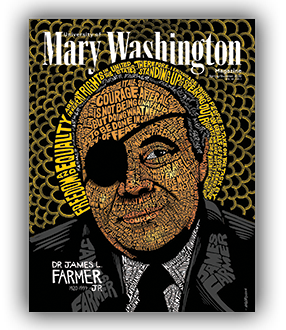By Emily Freehling
How much do Mary Washington students engage with the broader Fredericksburg community?
That question has been discussed in the city for as long as the school has sat on Marye’s Heights. But there are plenty of community connections to be found in the experience of Carleigh Rahn ’22, an education major from Loudoun County.
Rahn talks fondly of helping an older campus neighbor with yard work as part of UMW’s annual Good Neighbor Day. Afterward, she stayed for coffee and brownies and heard his history of serving in the military and living in England.
One day she was stopped at a traffic light when two little girls rolled down the rear window in the adjacent car and began yelling her name. These were children she had tutored at the Bragg Hill Family Life Center, which serves at-risk youth.
“It’s true connection,” Rahn said. “It’s crazy how much you get to feel a part of someone else’s life here.”



Rahn’s service experiences have been part of her work as an intern and mentor with UMW’s Community Outreach and Resources, known on campus as COAR.
In 2020, COAR marks 30 years of helping connect Mary Washington students with service opportunities in the broader Fredericksburg community. COAR is a clearinghouse that helps students volunteer with some of Fredericksburg’s most respected community organizations – Hope House, Downtown Greens, and Friends of the Rappahannock, to name a few.
At the Thurman Brisben Center, a homeless shelter serving the Fredericksburg region, Community Relations Manager Joe Hargrove said that for years, UMW students have helped with cleaning, organizing, and providing entertainment for children.
“It is amazing to see our children finish dinner on Thursday and then wait at the front door in anticipation of the UMW students,” he said. “COAR has brought a lot of joy to our residents over the last several years, and we are very, very grateful.”
In 1989, then-President William Anderson tapped student leaders to create an umbrella organization for service opportunities. UMW’s goal of producing graduates with a heart for serving those around them has been a priority since.
Anderson’s call came to Liz Baumgarten Heagy ’91, a political science major who was vice president of the Student Government Association during her junior year.
On a student government retreat, she said, Anderson said he wanted to better organize volunteer efforts among students and connect them with the larger community.
“It was a movement overall in the country at the time,” said Heagy, who after receiving a law degree from Temple University has worked with nonprofits most of her career. “A lot of college campuses either had volunteer centers or were starting them.”
Heagy worked closely with Associate Vice President and Dean of Student Life Cedric Rucker ’81
to build the organization.
“Students were out in the community in dribs and drabs,” at the time, Rucker recalled. “This was a question of, how do we make it more holistic? How do we connect it to the university’s goals and initiatives, its approach to learning?”
When it came time to name the organization, both Rucker and Heagy quickly recognized that the acronym COAR was a homophone of CORE – the Congress of Racial Equality, a landmark civil rights organization founded by civil rights leader James Farmer, who was teaching at UMW at that time.
At first, Heagy feared the similarity would be confusing, but Rucker saw plenty of parallels between Farmer’s inspiration and UMW COAR’s purpose.
Lecturing to Mary Washington students in 1986, Farmer called the civil rights era of the 1960s “the nation’s finest hour,” because it was a time when “millions, white and black, found something to believe in that was outside of themselves and bigger than they.”
Helping students find a cause beyond a diploma and a career has become a part of UMW’s mission. Promoting community service and civic engagement is the first goal listed in President Troy Paino’s strategic vision, adopted by the Board of Visitors in 2017. It’s also part of the ASPIRE vision statement, now visible on banners throughout campus. The “E” in the acronym “ASPIRE” stands for “engagement,” through leadership and community service.
Rucker said these ties to service can be linked to Farmer’s legacy.
“What is our obligation as an institution?” Rucker asked. “Are we just here to grant diplomas, or are we really connected to the future? … I think having Dr. Farmer as a touchstone for that puts us in a very special position.”
To bridge higher learning with the broader community, UMW opened the Center for Community Engagement (CCE) on campus in fall 2019. The center builds connections among students, faculty, staff, and community partners.
It includes COAR, as well as alternative service breaks – service trips offered to students during school breaks – and the newly launched UMW Votes, a nonpartisan program that educates students about all aspects of the voting process. The university offers “community engaged” classes that include a 15-hour community service requirement related to course learning outcomes.
“Service helps build citizenship skills,” said Sarah Dewees, associate director of the CCE. “Understanding how society works and what they can do to give back to society is a really important part of the growth process students go through while they are at UMW.”
Involvement with COAR also builds organizational and leadership experience. Students can work their way up through internships to paid staff positions, and, for three decades, the group has been entirely student-run.
“The foresight they had to allow students to mentor other students and develop their leadership skills – it is really a brilliant model,” Dewees said.

